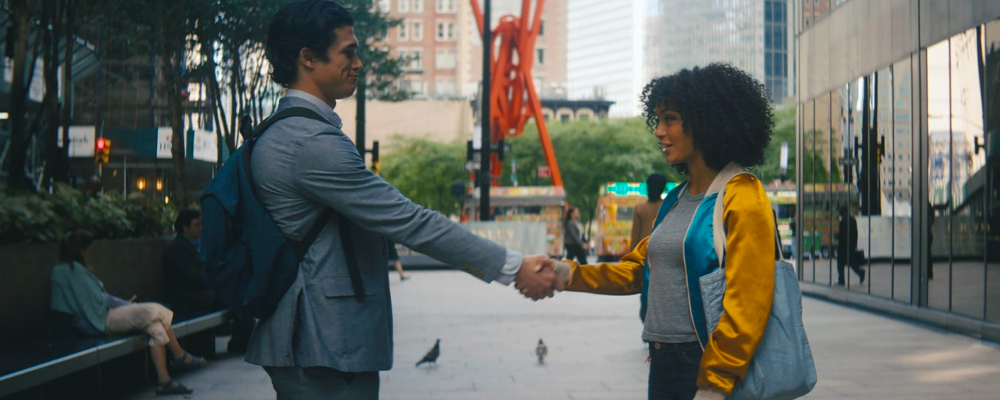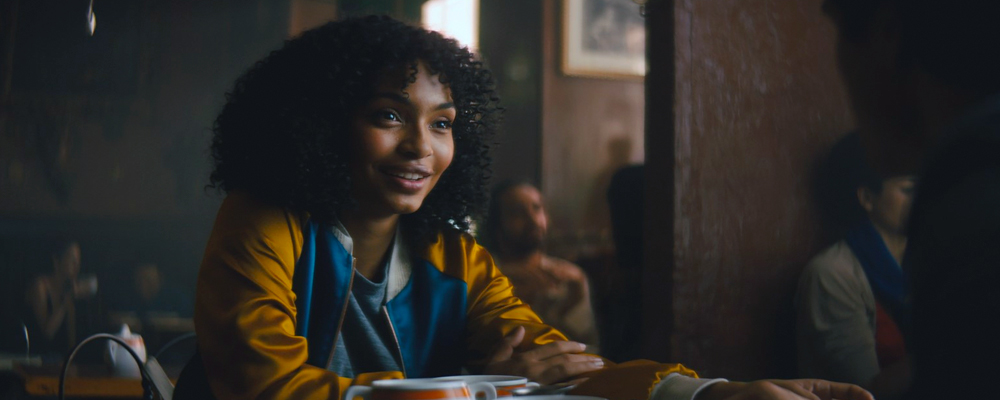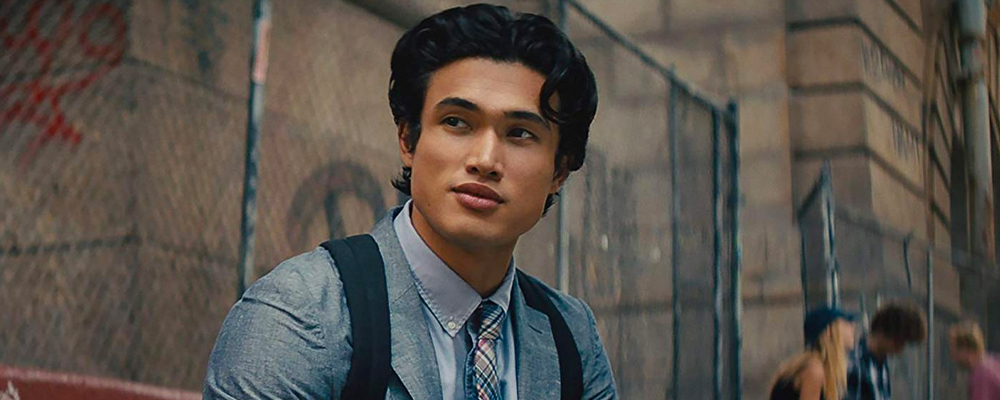Teenagers Find Love Under the Threat of Deportation in ‘The Sun Is Also a Star’
Alci Rengifo
The immigrant experience gets the young adult romantic treatment in “The Sun Is Also a Star.” In the spirit of the title, this is the kind of film where connections are made between astronomy and love, with teenagers convinced the writing on a jacket proves destiny is real. What makes this one different from similar offerings is how it combines all the cheesiness with an admirable attempt at exploring immigrant communities, and what it feels like to not be a citizen in the era of Trump. It does not quite deliver a truly satisfying, or even romantic, experience, but at least it tries to go a bit further than most.
Natasha Kingsley (Yara Shahidi) is a high school senior in New York City and daughter of Jamaican immigrants. As the film opens her family has one day left before having to leave the country. They don’t have permanent residency status and after her father Samuel (Gbenga Akinnagbe) was caught in an ICE raid, Natasha’s family was served deportation orders. Refusing to give up, Natasha tries a last-ditch effort to find an immigration lawyer to help. Meanwhile Korean-American fellow high schooler Daniel Bae (Charles Melton) is facing his own hassle. He wants to be a poet, his immigrant parents demand he be a doctor. On his way to an interview for an important recommendation for a top college, Daniel spots Natasha at Grand Central Terminal and notices her jacket has “Deus Ex Machina” written on the back. This is precisely what he wrote in his notebook that morning, which must mean it’s fate! Daniel chases Natasha down and shares his theory, which she finds crazy since she’s an aspiring astronomer and therefore believes in rational thinking and the scientific method. He proposes she give him one day to make her fall in love with him. Of course he doesn’t realize her time in the country is running out.
“The Sun Is Also a Star” is based on an acclaimed YA novel by Nicola Yoon, which was a National Book Award finalist. Yoon’s other work has been previously adapted into another swooner, 2017’s “Everything, Everything.” But the challenge with “The Sun Is Also a Star” is in trying to translate metaphysical romantic storytelling into a straight-forward teen film. What Yoon evokes on the page director Ry Russo-Young and writer Tracy Oliver strip down to a well-lit walk around New York. Some of the intelligence in Yoon’s prose shines through in scenes where Natasha quotes Carl Sagan, or discusses the multiverse theory to ponder all the different decisions we could make in life (such as running off with the handsome Korean guy or not). It’s also refreshing to have moments where a female high schooler is not the stereotype, misty-eyed romantic. Instead Natasha puts Daniel on the spot with an articulate monologue on how love might just be a fancy term to explain our hormones. The imbalance in the writing is so obvious that we actually wonder why Natasha would even consider Daniel. She’s articulate, well-versed and head-strong, while he just mumbles about fate and love with naïve one-liners. In the same way we get insights into Natasha’s scientific interests, we should also learn about what makes Daniel passionate about writing. But never does he share a poem, or discuss favorite writers, or even give off the air of a born wordsmith. It doesn’t take any of Daniel’s prose to finally get Natasha to make out with him, just a karaoke rendition of “Crimson and Clover.” You almost wonder if maybe his parents are right and he should stick with medical school.
Where the film is strongest is when it detours from all the teen romance and focuses on the theme of the immigrant experience. Daniel’s parents are South Korean and run a black hair care business, which we learn harkens back to the Cold War when the U.S. blocked the sale of wigs from China, so Koreans took over the industry. But when Daniel takes Natasha to his parents’ store his rebel brother Charlie (Jake Choi), who we wish we could learn more of, makes crass, racist jokes while the dad (Keong Sim) offers her a free product while making a semi-racist assumption about her hair. Yoon’s novel and the film also flip around stereotypes in a refreshing way, making the soon to be deported Natasha the actual scientist, while Daniel rebels against the general idea of Asians demanding their kids be doctors. There is real pressure in moments where Natasha begs to see a lawyer played by John Leguizamo, pleading her case to stay. The writing here is charged with political commentary on being an undocumented immigrant under the shadow of Trump, when the prospect of staying becomes distant even for those who have already planted roots. Yara Shahidi of “Grown-ish” fame delivers the best performance, full of personality and the angst of feeling the clock running out. Charles Melton, also a TV star for his role as a tough jock in “Riverdale,” is less compelling. He’s convincing as a nice guy with a crush, but not as a free-spirited poet.
In film form the romance just seems to fall a bit flat against the real drama involving Natasha’s potential deportation. “The Sun Is Also a Star” becomes an oddly mixed affair as strong moments crash into weaker ones. There’s heart in a scene near the end, where the two would-be lovers hold hands, and we get a vision of what could be if she can stay. The true heartbreak of separation is felt. But then the film settles for a final scene so contrived that it might inspire more laughs than sighs. It’s one of those moments that takes the idea of destiny so literally, it almost proves Natasha’s earlier scientific speech.
“The Sun Is Also a Star” is a promising idea buried somewhere in a movie that focuses too much on teen romance bullet points. It’s far more compelling when it stays on the theme of humans being forced to migrate by a system becoming less forgiving. Where the movie lacks passion it still has good intentions.
“The Sun Is Also a Star” opens May 17 in theaters nationwide.




